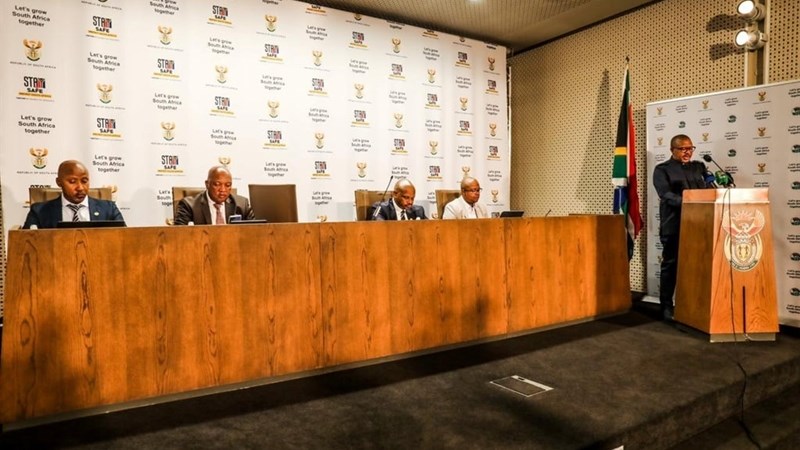Central SA
Free State a culprit in R3bn's fraudulent licence disc scams─── 11:00 Tue, 25 Oct 2022

A whopping R3 billion has been lost due to the fraudulent issuing of licence discs, according to the Road, Traffic Management Corporation's (RTMC) chief executive, Makhosini Msibi.
Speaking at a media briefing in Tshwane on Monday, Msibi said Gauteng, Mpumalanga, and the Free State were the three provinces "playing a major role" in the fraudulent issuing of licence discs.
He said Gauteng alone had lost about R1.2 billion from fraudulently issued licence discs. He stressed that the vehicles carrying these illegal discs were owned "mainly by a number of businesspeople".
Msibi, the head of the Special Investigating Unit (SIU), Andy Mothibi, and the Minister of Transport, Fikile Mbalula, briefed the media about the findings of the SIU and RTMC investigations.
The SIU presented an interim report identifying several administrative actions that various authorities should take. The unit has until March next year to complete the investigations and table a final report.
Msibi also said 820 cases relating to the fraudulent issuing of licence discs, driving licences, learner licences, and road-worthy certificates were being investigated.
In those cases, 116 people had already been arrested, including Mpumalanga licensing officials who were detained several weeks ago in a R60 million motor vehicle licence fee dumping corruption case.
They allegedly unlawfully and intentionally printed licence discs on the official face-value documents that showed R0.00 had been paid.
Some of those arrested were reportedly clerks at registering authorities in Mpumalanga.
Msibi on Monday said they had also looked at the origins of the criminal element.
"These issues of the fraudulent issuance of motor vehicle discs have been compounded by the closure of the post office services. When the post offices were closed, they were not reported timeously, and the criminals seized the equipment used by the post offices," he added.
Msibi said the investigation had led them to uncover criminal methods used by those who infiltrate the system.
Mothibi said the SIU would work tirelessly to uncover corruption within the Department of Transport and road traffic entities.
"It is now time for consequence management in all its forms. Whether it is prosecution, we want to see that following disciplinary action, those corrupt officials must be taken out of the system. We have identified them, and we will make referrals to RTMC so that action can be taken, and they are removed from the system," Mothibi said.
Meanwhile, Mbalula said President Cyril Ramaphosa had "been emphatic that there is no space for corrupt people in our government. Working with law enforcement authorities, we are making headway in uprooting malfeasance and corruption.
"Over the last year, we have been working with MECs and Salga [South African Local Government Association] to implement a number of interventions that are intended to address the root causes of these systemic and operational challenges.
"At the core of these interventions is a seamlessly integrated value chain guided by a single standard under the leadership of the RTMC. This would constitute a new service delivery model for all DLTCs in the country," he said.
He said the SIU had identified the issues that gave rise to the corruption and malfeasance.
They are:
• Backlog and desperate need for driving licences, roadworthy certificates, registration of vehicles drive fraudulent conduct;
• Corrupt officials and criminal middlemen exploit systemic weaknesses;
• Negligent and/or incompetent officials some of whom have access to the NaTIS system;
• Inadequate compliance monitoring by relevant authorities;
• Lack of and/or weak management and oversight;
• Lack of standard operating procedures (SOP) across national, provincial, local authorities and private institutions;
• Lack of MoU with local authorities, DLTC, private vehicles testing centres and private institutions,
• No agreed minimum performance standards for officials and/or employees;
• No financial autonomy resulting in inadequate resourcing;
• Legislative gaps;
• Greed which drives irregular and criminal behaviour;
• Roadworthy certificates issued without vehicles tested;
• Unlawful selling of licences by DLTC officials to private people;
• Money dumping. This relates to traffic fines; SANRAL e-toll invoices, AARTO infringements, licence fees, dumped on deceased people or people with duplicate identifications in the form of a South African identity number;
• Driving schools paying driving licence examiners to issue licences irregularly and/or fraudulently;
• The conversion of false foreign licences into South African card licences.













